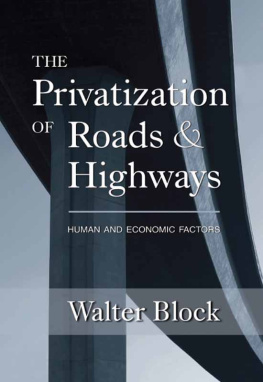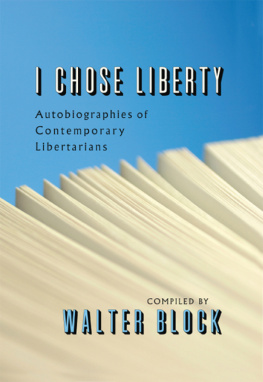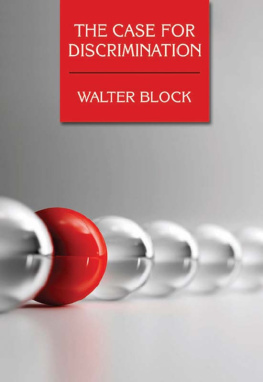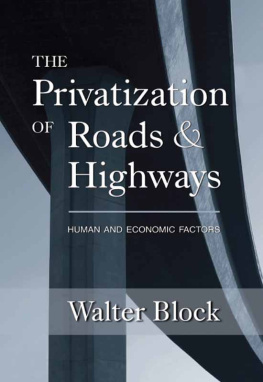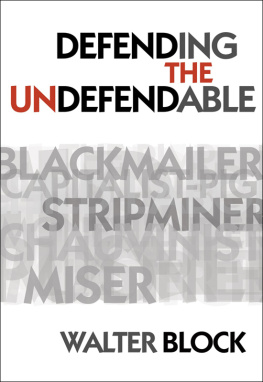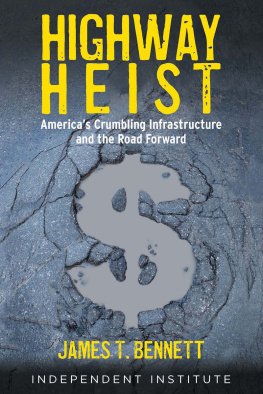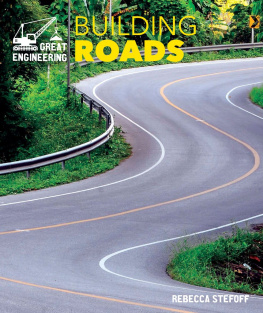The Privatization
of Roads and Highways
The Privatization
of Roads and Highways
Human and Economic Factors
Walter Block
LvMI
MISES INSTITUTE

This book is dedicated to my fellow Americans, some 40,000 of them per year who have died needlessly in traffic fatalities. It is my sincere hope and expectation that under a system of private roads and highways in the future, that this number may be radically reduced.
2009 by the Ludwig von Mises Institute and published under the Creative Commons Attribution License 3.0.
http://creativecommons.org/licenses/by/3.0/
Ludwig von Mises Institute
518 West Magnolia Avenue
Auburn, Alabama 36832
www.mises.org
ISBN: 978-1-933550-04-6
Contents
Foreword
Abolishing Government Improves the Roads
L ook on the back of your ATM or debit card. Check your credit card, too. Whoever your bank is, on the back of the card youll see the logos of other firmsCirrus, Plus, Star, maybe others. Cirrus is an ATM network management system owned by MasterCard, Plus is owned by Visa, and so on. There is cooperation between companies, and the network managers are somewhat independent. For example, Visa debit cards often have a Cirrus logo on the back.
This means you can use your debit card, the one from your little, three-branch local bank, to get instant cash from an ATM clear across the country. Yes, each bank charges you a dollar or two. They should. A single ATM costs $100,000 to install, costs money to maintain and manage (people have to put money in it and take money out daily), and it costs participating banks to hire Cirrus to move the money around.
More important is what we learn about the markets capabilities. One of the objections to privatizing roads is that wed have to stop at a toll booth at every intersection. A five-minute commute to the grocery store would require, for me, three toll booths, seventy-five cents, and become an eight-minute commute, according to this objection. But its not so, and heres why:
Our time is worth a few pennies to us. Cirrus and Pulse would charge us, wild guess, three dollars a month or less to provide magnetically encoded stickers for our cars. Machines scattered about the roads, or sensors under the pavement, would record our comings and goings. That information would go to Cirrus and Pulse, and from them to our road providers. We might get three or four monthly bills, or just one, depending on the wherewithal of road owners. Some road owners, out in the woods, would still have toll booths, which would work perfectly wellless traffic and a slower pace of life make it no big deal. I use a toll booth occasionally in Atlanta, and the delay is only a few seconds.
Lest you think your money would be going up in exhaust fumes, remember that market firms, who must please customers to stay in business, provide everything better and less expensively than government, without that nasty moral hangover of forcing people to pay for things they may not use or want. Your gasoline price already includes forty to fifty cents per gallon in taxes for road building and maintenance. This means Im paying twenty-five to thirty-three dollars per month for road use now. With privatization of roads, that cost would go down, probably considerably. It happens every time anything is moved from government hands into private hands.
There are other benefits that would follow road privatization. The private roads that exist now have fewer accidents than public roads, probably in part because theyre better maintained: If private road builders let potholes remain, get reputations for high accident rates, or do repairs during rush hour, they have to deal with complaints and with people choosing other roads.
Pollution and pollution controls on automobiles would also be handled by road privatization. If auto pollution were to grow too thick, people living near the offending roads would sue the biggest, most obvious target: the road owners. Road owners would therefore charge higher fees for cars without up-to-date inspection stickers. Auto manufacturers would build pollution-control equipment into cars, and advertise how cleanly they run. Automakers do this already, but under the gun of a government that mandates pollution levels and what kind of pollution controls manufacturers use. Without government interference, engineers would be free to compete to provide different technologies to reduce costs and improve horsepower while providing cleaner burning engines. With the inspection stickers being coded to your automobiles age, manufacturer, and model, there might be a separate pollution rider on your monthly statement. Drivers of new Hondas might see a discount, while drivers of old belchers would pay fees that might be higher than the road tolls themselves.
Isnt the market grand? Im just one person describing likely market solutions; imagine how efficient solutions would become with 280 million minds working on the issue. Reality continues to provide apparent (but not real) obstacles in the mind of the statist: What about new roads, and the thorny problem of eminent domain? Again, the market comes to the rescue. First, since roads are already there, getting started would involve nothing other than entrepreneurs bidding to take over. (Who would they pay when they buy the roads? U.S. government creditors. Once the government sells all its land, the governments vote-buying debt might be paid off.) Even so, new roads are being built everywhere today, by developers who buy land and convert it to new uses.
Land alongside interstates is cheap in some places, and expensive in others. Widening rural interstates wouldnt be a problem. (There would be some correlation between road tolls and road quality/congestion.) Prices would be higher where road owners face little competition, such as in Alaska, but lower where people have alternatives. If prices for rural stretches of interstate get too high, people will use planes, trains, and buses, and road owners will be forced to lower their prices. If you think youre getting the interstate for free, think again: Those gas taxes mean youre paying one to two cents per mile now.
Anyone who wanted to build a new interstate would face the huge task of buying up land crossing perhaps hundreds of miles. Widening existing highways would be more likely. In Los Angeles and other large cities where traffic is consistently choked, road owners would have the incentive, and plenty of funds, to buy property along highways so they could widen them. Owners would also have incentives to improve interchanges, such as Spaghetti Junction in Atlanta. Roads would improve overall. (I interviewed a county road engineer years ago, and he told me they design circular entrance ramps deliberately with varying radiiexperienced as odd changes in the curve, which force you to constantly readjust the steering wheelto keep drivers awake. How many of us have trouble keeping focused for fifteen seconds on a curving entrance ramp?)
Without having had forcible government the last two hundred years, would the interstate system have come about? We cant know, but we shouldnt care. Without an interstate system, we would still have plenty of commerce; probably more than we have now (when railroads were builtlargely with the help of government subsidiesmuch of the land between the coasts was unclaimed, and thus open to use. Much would still be unclaimed today without government.) We have what we have. Abolishing government is the way to improve what we have.

